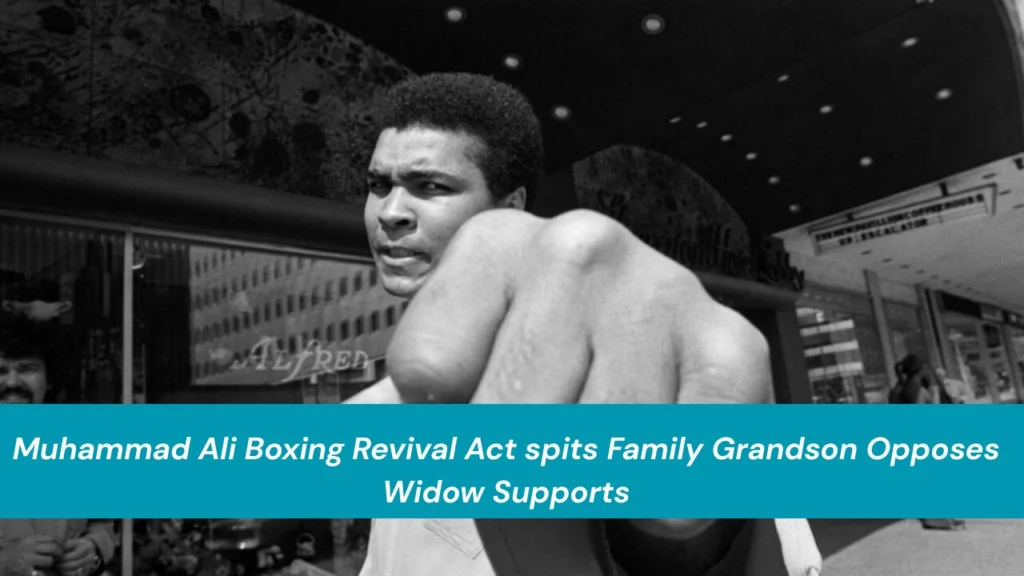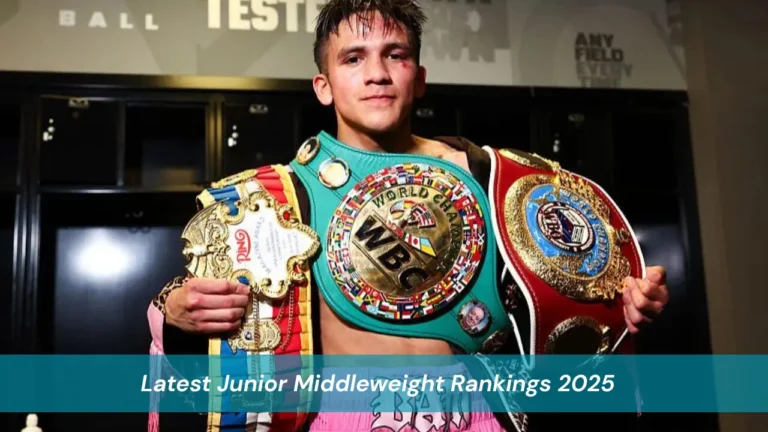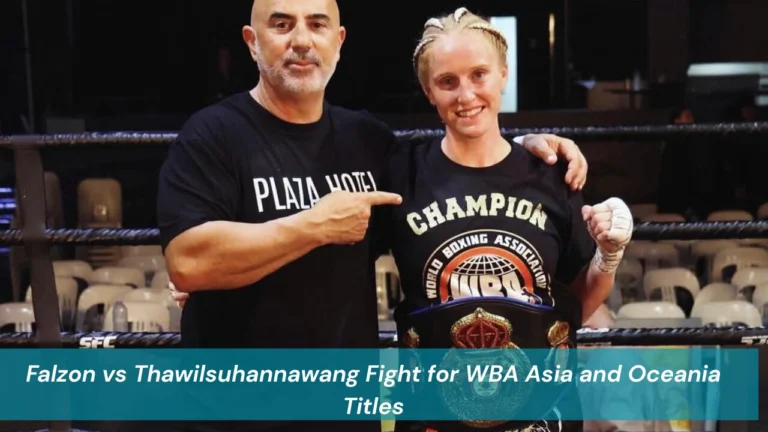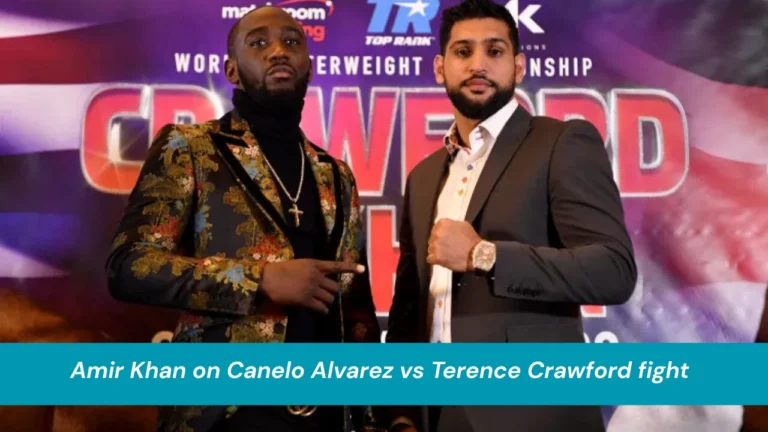A fierce and unexpected conflict has emerged in the boxing community that even carries the name of the legend himself Muhammad Ali. The newly proposed Muhammad Ali Boxing Revival Act also referred to as the Muhammad Ali American Boxing Revival Act has reignited debate about the future of the sport. Proponents argue it sets the stage for modernization, offering improved safety standards, federal oversight, and guaranteed fighter pay. Detractors warn that it could dismantle protections established by the original 2000 Ali Act and pave the way for unchecked promoter dominance.
The most polarizing response, however, comes from within the Ali family. Lonnie Ali, Muhammad’s widow, has lent her support to the bill, suggesting her husband would be proud to be associated with reforms that claim to uplift fighters. In stark contrast, his grandson rising star boxer Nico Ali Walsh has publicly denounced the legislation, arguing it jeopardizes the very freedoms and protections his grandfather once fought for.
This article delves into the proposed legislation’s key provisions, the divided reaction within the Ali family, its potential impact on the sport, deeper legal and historical implications, and the broader question of whether it truly honors or undermines Muhammad Ali’s legacy.
Key Takeaways
- The Muhammad Ali Boxing Revival Act proposes federal updates to boxing law, including Unified Boxing Organizations (UBOs), minimum fighter pay, and enhanced safety protocols.
- Lonnie Ali supports the bill as a modernization effort honoring Muhammad Ali’s legacy, while grandson Nico Ali Walsh opposes it, citing risks to fighter protections.
- Critics warn UBOs could centralize promoter power, potentially undercutting pay and independent oversight similar to issues seen in UFC.
- The act could fragment the boxing landscape, benefiting major promoters but potentially marginalizing smaller commissions and independent fighters.
The Original Ali Act A Milestone in Boxing Reform
To understand the implications of the Revival Act, one must first appreciate the historical context of the Muhammad Ali Boxing Reform Act (commonly known as the Ali Act), passed in 2000. The legislation was designed to safeguard professional boxers from exploitation, correct conflicts of interest, and enhance transparency in boxing governance.
The original Ali Act amended the Professional Boxing Safety Act of 1996 to require promoters to disclose financial terms, ensure rankings were independently verified, ban coercive long-term contracts, and separate the roles of promoter and sanctioning body official. As a direct response to rampant corruption, rigged rankings, and exploitative deals of the 1990s, the law stood as the only major sport-specific federal regulation in the United States aimed at protecting athletes.
The Revival Act What’s Being Proposed
In July 2025, Representatives Brian Jack (R-GA) and Sharice Davids (D-KS) introduced the Muhammad Ali American Boxing Revival Act in Congress a sweeping and bipartisan effort touted as the first major update to federal boxing law in more than two decades.
Unified Boxing Organizations (UBOs) are central to the proposal. These new entities would operate alongside traditional sanctioning bodies like the WBC, WBA, IBF, and WBO, but with substantial autonomy. UBOs could crown champions, dictate rankings, and create fights functioning almost as parallel leagues licensed under federal law.
The act mandates a minimum payment of $150 per round for all professional boxers under these UBOs, theoretically guaranteeing earnings even for lower-profile fighters. Proponents argue that current state-by-state variability leaves too many boxers undercompensated.
Additionally, the legislation strengthens health and safety requirements, including mandatory physical exams with eye checks and blood work, health insurance coverage of at least $25,000 for fight-related injuries, and the presence of ambulances and multiple licensed physicians at ringside. UBOs must also conduct in-competition drug testing for at least half of participating fighters.
Supporters including the Association of Boxing Commissions (ABC), Lonnie Ali, and the promoters behind TKO/Zuffa Boxing emphasize that the bill preserves the original Ali Act while providing added clarity, consistency, and protections for professional boxers.
Lonnie Ali Backs It Grandson Opposes
Lonnie Ali, co-founder of the Muhammad Ali Center and widow of the late champion, has publicly endorsed the Revival Act. She expressed that the sport enabled Muhammad Ali’s rise as both a global figure and civil rights icon, and she believes the legislation continues his mission by offering new protections and opportunities for future generations of boxers.
Jake, apart from contributing to the bill’s design, expressed through a joint statement that the legislation aims to restore American boxing to its historic prominence, encouraging investment and giving boxers greater safety and pay options.
In stark contrast, Muhammad Ali’s grandson, Nico Ali Walsh, took to X (formerly Twitter) to condemn the proposed changes. He emphasized that his grandfather fought to protect fighters from injustice and coercion, and warned that weakening the Ali Act would hand too much power back to promoters, endangering the welfare of fighters. “Remove it, and promoters take control while fighters get paid less,” he wrote “EssentiallySports.
Media outlets such as Athlon Sports have highlighted this intra-family divide, illustrating how a boxer by heritage is at odds with those he calls on to preserve his grandfather’s legacy.
Supporters’ Argument Modernizing Boxing for the 21st Century
Proponents argue that boxing is in a state of decline, TV viewership is shrinking, major networks have pulled back, and there is regulatory inconsistency across states. Representative Jack said boxing “is dying in America,” citing falling pay-per-view numbers, HBO and Showtime’s exit, and expiring broadcast deals.. They say the Revival Act corrects outdated federal regulations and fosters much-needed investment in the sport.
TKO/Zuffa Boxing led by Dana White and backed by Saudi partners actively supports the legislation, viewing UBOs as mechanisms to inject innovation, marketing power, and unified ranking systems into boxing, challenging the status quo and giving fans simpler storylines and promoters more structure.
The bill’s health and safety enhancements, like prescribed insurance coverage, ringside ambulances, and drug testing protocols, are touted as updates that align with modern sports medicine standards.
Critics’ Concerns Promoter Dominance and Erosion of Protections
Legal and regulatory experts, however, have voiced strong reservations. Combat sports attorney Erik Magraken warned that UBOs would “gut the key protections from the Ali Act,” allowing promoters to control both rankings and titles, undermining independent oversight and the sport’s integrity.
Similarly, lawyers Patrick English and Kurt Emhoff argue the legislation is structured to benefit one party—effectively creating a pathway for TKO (and its Saudi backers) to establish a near-monopoly in U.S. boxing. They say that even seemingly benign elements like the $150 per round minimum and minimal insurance updates are negligible in real-world value and serve more as window dressing.
Financial analysis points out that a four-round fight under the act guarantees a minimum of $600, which may fall below current norms in many jurisdictions, especially once deductions for trainers and managers are subtracted from Boxing Essential
Moreover, critics draw parallels with the UFC’s model where fighters receive an estimated 15–18% of event revenue, compared to 50% in leagues like the NBA and NFL. Despite generating billions, UFC fighters have a history of anticompetitive complaints and low revenue share. A class-action suit resulted in a $380–$380 million settlement, underscoring structural imbalances they argue could be replicated in boxing through centralized promoter-led UBOs.
The Broader Impact What This Means for Boxing
If the Revival Act passes, we may see a fragmented landscape emerge with traditional sanctioning bodies coexisting alongside powerful new UBOs. While this could offer boxers more pathways, it also risks encouraging monopolistic dominance by organizations with deep pockets and centralized control.
Smaller promoters and regional commissions may struggle to compete under uniform federal requirements and UBO structures, potentially marginalizing independent voices in favor of major players like TKO/Zuffa. In turn, boxers might face reduced bargaining power, having fewer independent avenues to pursue titles or better pay.
While modernized safety standards and guaranteed minimums sound beneficial, they may inadvertently legitimize lower compensation overall and undercut existing protections originally intended to curb promoter overreach.
A Legal and Historical Parallel
Looking back, the original Ali Act emerged as a corrective to unchecked promoter influence and corrupt ranking systems, offering transparency and independent accountability. The Revival Act aims to build on that legacy but if UBOs become dominant, the sport might circle back to the issues the Ali Act was designed to eliminate.
The UFC’s antitrust litigation and revenue structure offer a stark example of how promoter-led centralized models can underpay athletes while keeping stakeholders in the dark. If boxing follows a similar trajectory, fighters may find themselves in familiar, precarious territory without meaningful protections or recourse.
FAQs
What is the Muhammad Ali Boxing Revival Act?
The act is proposed federal legislation introducing Unified Boxing Organizations (UBOs) as alternatives to existing sanctioning bodies. It also mandates minimum pay, improved health protocols, insurance coverage, and anti-doping measures.
How much would fighters earn under the new bill?
The bill sets a national minimum of $150 per round. A typical four-round fight would guarantee $600 before deductions potentially lower than current payouts in many regions.
Why is Muhammad Ali’s grandson opposed?
Nico Ali Walsh argues the act undermines the protections his grandfather fought for, warning that promoter-led UBOs could strip fighters of control and diminish pay.
What are UBOs?
Unified Boxing Organizations are federally licensed sanctioning bodies created by the bill. They could create internal rankings, award titles, and hold matches, potentially operating as parallel leagues alongside traditional organizations.
Could this legislation genuinely benefit boxers?
Supporters say yes pointing to standardized pay, safety protocols, and streamlined promotion. Critics warn that these benefits are superficial, with the model ultimately giving promoters too much power.
Conclusion
The Muhammad Ali Boxing Revival Act has emerged as one of the most consequential and contested reforms in recent boxing history. It embodies a complex clash of ideals and interests. On one side, lawmakers and Lonnie Ali argue it modernizes a stagnant legal framework, ensuring safety, security, and investment in boxing’s future. On the other hand, critics, including Muhammad Ali’s own grandson, contend that it jeopardizes hard-won protections and risks reestablishing a promoter-controlled system that the original Ali Act fought against.
As the bill moves forward in Congress, its outcome will determine whether boxing evolves toward greater security and fairness or whether history repeats itself under new branding. Visit Boxing Essential to explore more.




